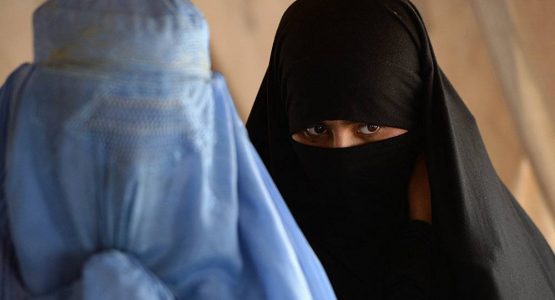
Islamic State housewives are not covered by ‘harshest ever’ terrorist act
Sweden’s leading terrorism researcher Magnus Ranstorp called the law “ineffective” and described the country’s handling of the jihadist issue as a “chain reaction of delays”.
The Swedish parliament has recently passed a bill that criminalises conspiracies with terrorist organisations, which ostensibly targets jihadists, or “foreign warriors” to use the Swedish term.
The law will come into force on 1 March, but is seen as somewhat belated compared to other countries, as Norway banned participating in terror groups as early as 2013. By contrast, Sweden hadn’t begun to contemplate a similar law until 2017.
The Swedish law is also comparatively milder than those of its Scandinavian peers, as it is not retroactive and, as Justice Minister Morgan Johansson confirmed, doesn’t include so-called Daesh* brides.
“No, not cooking and that kind of support activities, no. We could not go so far, but [the law] is aimed to deal with weapons, renting premises, and carrying out transportation. Even if we have come a long way, we will not go as far as I would like,” Morgan Johansson told national broadcaster SVT, stressing that the current law is still “Sweden’s harshest”.
Sweden directly contributed to the terrorist cause with about 300 jihadis, among the highest percentages per capita in Europe. Almost none of the jihadists have faced prosecution for crimes committed in the Middle East, whereas several were later convicted of crimes committed upon return to Sweden. Numerous politicians and pundits, including Sweden’s leading terrorism researcher Magnus Ranstorp of the National Defence College, have slammed the current legislation as inadequate, citing the unfeasible burden of proof. Ranstorp also described Sweden’s handling of the jihadists as a “chain reaction of delays”.
By contrast, Norway has already sentenced 13 Daesh returnees, including women who have been in charge of cooking and doing housework for the jihadis. Their contribution is considered to have helped the Islamists to engage in terrorist activities.
Denmark went so far as to pass a law that allows the authorities to deprive suspected jihadis of citizenship administratively, that is, without a trial. Passed in November 2019, the law has been applied several times in order to bar certain people from returning to Denmark. Over a dozen jihadists have been convicted by Danish courts.
“Morgan and the Social Democrats don’t want those who have cooked for the terrorists to be sentenced. Only those who armed with weapons. All of a sudden I understand why they had so many chefs and ambulance drivers,” one Twitter user mused bitterly.
Sweden’s leading terrorism researcher Magnus Ranstorp called the law “ineffective” and described the country’s handling of the jihadist issue as a “chain reaction of delays”.
The Swedish parliament has recently passed a bill that criminalises conspiracies with terrorist organisations, which ostensibly targets jihadists, or “foreign warriors” to use the Swedish term.
The law will come into force on 1 March, but is seen as somewhat belated compared to other countries, as Norway banned participating in terror groups as early as 2013. By contrast, Sweden hadn’t begun to contemplate a similar law until 2017.
The Swedish law is also comparatively milder than those of its Scandinavian peers, as it is not retroactive and, as Justice Minister Morgan Johansson confirmed, doesn’t include so-called Daesh* brides.
“No, not cooking and that kind of support activities, no. We could not go so far, but [the law] is aimed to deal with weapons, renting premises, and carrying out transportation. Even if we have come a long way, we will not go as far as I would like,” Morgan Johansson told national broadcaster SVT, stressing that the current law is still “Sweden’s harshest”.
Sweden directly contributed to the terrorist cause with about 300 jihadis, among the highest percentages per capita in Europe. Almost none of the jihadists have faced prosecution for crimes committed in the Middle East, whereas several were later convicted of crimes committed upon return to Sweden. Numerous politicians and pundits, including Sweden’s leading terrorism researcher Magnus Ranstorp of the National Defence College, have slammed the current legislation as inadequate, citing the unfeasible burden of proof. Ranstorp also described Sweden’s handling of the jihadists as a “chain reaction of delays”.
By contrast, Norway has already sentenced 13 Daesh returnees, including women who have been in charge of cooking and doing housework for the jihadis. Their contribution is considered to have helped the Islamists to engage in terrorist activities.
Denmark went so far as to pass a law that allows the authorities to deprive suspected jihadis of citizenship administratively, that is, without a trial. Passed in November 2019, the law has been applied several times in order to bar certain people from returning to Denmark. Over a dozen jihadists have been convicted by Danish courts.
The perceived lenience of the new law has irked many Swedes.
“Morgan and the Social Democrats don’t want those who have cooked for the terrorists to be sentenced. Only those who armed with weapons. All of a sudden I understand why they had so many chefs and ambulance drivers,” one Twitter user mused bitterly.
Others suggested that this loophole has been left on purpose.
“It is obvious that the women in the detention camps still pose a threat to the West and thus cannot return. Everyone in the camps still wears a full face-covering veil, despite whining they did not want to be part of the harsh Sharia culture at all. Why don’t take it off then?” another one mused.
About half of Sweden’s jihadists have already returned “home” without risking any trial.
Source: Sputnik





